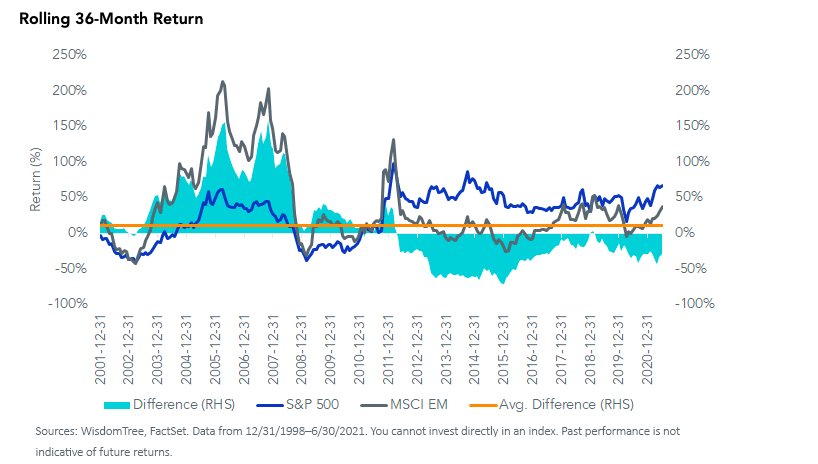By Alejandro Saltiel, CFA, Associate Director, Research
Emerging markets (EM) have struggled to find footing this year.
After a strong end to 2020, the asset class—which has become slightly growth-tilted in recent years—has been impacted by a value run-up, regulatory clampdown of technology companies in China and rising U.S. rates. All of this as U.S. markets continue to surge.
As seen below, the difference in trailing three-year returns between the S&P 500 Index and the MSCI EM Index is at levels not seen since 2016, and market cycles have shown that this difference tends to revert to the long-term mean (+10%). We therefore encourage investors to look for the best strategic exposure to EM for their portfolio.

State-owned enterprises (SOEs) may be influenced by a broader set of national interests other than focusing solely on maximizing shareholder value. These conflicts of interest can cause stagnation in the long-term growth potential of these companies, which can result in operational inefficiencies and weaker levels of profitability.
State-owned banks in China are a prime example of these other interests—they are often asked to extend loans to troubled companies in the name of “national service.”
In my opinion, new-economy sectors may be better positioned to take advantage of a growing middle class and increased domestic consumption—trends we believe will persist into the future.
Meanwhile, old economy sectors rely more on international growth and could be more prone to suffer from global trade and unfavorable currency moves.
To read this article in its entirety, please go here.
This post first appeared on July 26 on the WisdomTree blog.
Photo Credit: gags9999 via Flickr Creative Commons
Important Risks Related to this Article
There are risks associated with investing, including possible loss of principal. Foreign investing involves special risks, such as risk of loss from currency fluctuation or political or economic uncertainty. Investments in emerging or offshore markets are generally less liquid and less efficient than investments in developed markets and are subject to additional risks, such as risks of adverse governmental regulation and intervention or political developments. Funds focusing their investments on certain sectors and/or regions increase their vulnerability to any single economic or regulatory development. This may result in greater share price volatility. Investments in currency involve additional special risks, such as credit risk and interest rate fluctuations. The Fund invests in the securities included in, or representative of, its Index regardless of their investment merit, and the Fund does not attempt to outperform its Index or take defensive positions in declining markets. Please read the Fund’s prospectus for specific details regarding the Fund’s risk profile.
The Standard and Poor’s 500, or simply the S&P 500, is a stock market index that tracks 500 large companies listed on stock exchanges in the United States. It is one of the most commonly followed equity indices. The MSCI Emerging Markets Index captures large and mid cap representation across 27 Emerging Markets (EM) countries. Investors can’t invest directly in indexes.



